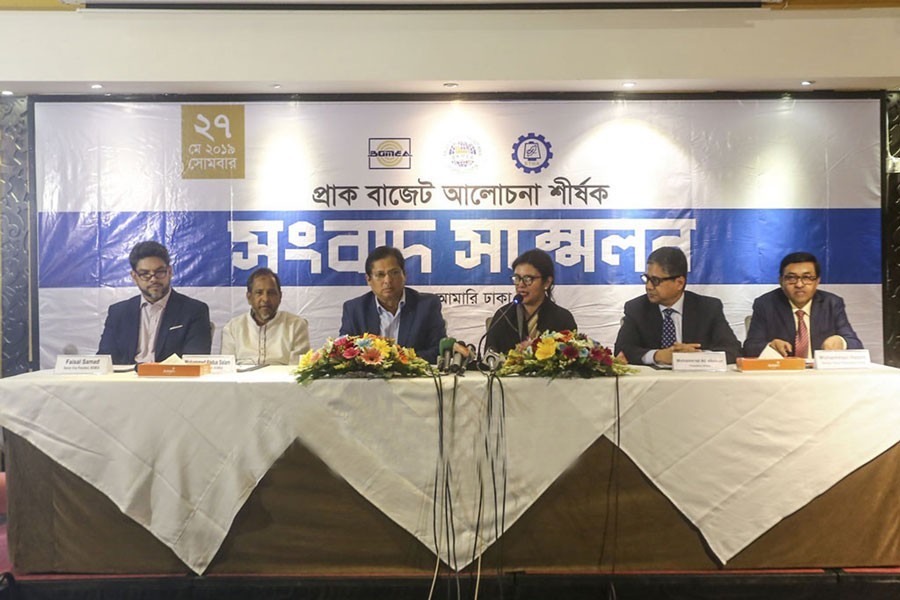The country's textile and clothing sector leaders have sought five per cent cash incentive on export receipts, regardless of destinations, for the next five years to help remain competitive in the global market.
The sector is now having a tough time due to the rising cost of production in the country, low prices offered by buyers and strong local currency against the US dollar, they said, adding that currencies in many competing countries are depreciating.
Leaders of the Bangladesh Garment Manufacturers and Exporters Association (BGMEA), the Bangladesh Knitwear Manufacturers and Exporters Association (BKMEA) and the Bangladesh Textile Mills Association (BTMA) placed the demand at a pre-budget press conference held at a city hotel on Monday.
"The sector is now passing through a transitional period as small and medium factories are facing closure one after another for various reasons," said BGMEA President Dr Rubana Huq.
"If we consider only employment generation, the readymade garment sector needs incentive," she added.
Buyers are continuously pushing for price cut, she said, adding that the prices of locally-made apparel items have fallen by 7.04 per cent in the US and 3.64 per cent in the EU during the period from 2014 to 2018.
If the government provides five per cent cash incentive on the Freight on Board (FOB) price of the garment products for the next five years, the sector would rebound, said Ms Huq.
She also pointed out that the 4.0 per cent cash incentive given to apparel makers to explore non-traditional markets has helped increase the exports to $3.8 billion, registering a robust 450 per cent growth in the last 10 years.
The government would require an additional Tk 117.25 billion to give five per cent cash incentive on export to all the markets, she said, adding that the amount is not big one considering the contribution of the sector to the economy.
The BGMEA chief also sought export-supportive exchange rate for the export sectors, saying their competitive edge would increase by 6.0 per cent if the exporters get an additional Tk 5.0 against each dollar.
The trade body also placed other budgetary proposals for consideration at the press conference.
The proposals include continuation of the existing 0.25 per cent source tax, a reduction in the corporate tax rate to 10 per cent from the existing 12 per cent, special allocation for loan rescheduling facility for the garment and textile businesses, doubling the tenure of rescheduling of default loans, fixing the bank interest rate to a single digit immediately and setting up of an emergency fund of Tk 3.0 billion for the safe exit of small and medium factories.
Speaking at the event, BTMA President Mohammad Ali Khokon demanded a raise in the cash incentive for the textile sector to 15 per cent from the existing 4.0 per cent, saying that the existing support has hardly helped sustain their competitiveness, as they were facing various challenges like buyers' pressure for compliance, wage hike, price hike of dyes and chemicals and the fluctuating rate of yarn and cotton.
"Though the US is one of the largest markets for locally-produced knit, denim, home textile and terry towel items, exports of these items have remarkably declined due to the suspension of GSP and a high import duty (16 per cent) there," he noted.
The BTMA leader also demanded 16 per cent cash incentive for the US market to help remain competitive and increase exports there.
He urged the government to continue with the existing income tax rate for textiles and fix the source tax and corporate tax rates similar to those of the readymade garment sector.
"I hope Bangladesh Bank would announce incentive for the good borrowers, as it issued a circular fixing interest rate in between 7.0 to 9.0 per cent for the defaulters," he added.
Echoing the BGMEA demand for 5.0 per cent cash incentive, the BKMEA first vice president Mansoor Ahmed said although the export sector remained out of the purview of VAT, exporters were being harassed by the revenue officers.
Mohammed Hatem, senior vice president of the Exporters Association of Bangladesh, demanded five per cent cash incentive for all the export sectors and a waiver from submitting VAT return.
He also urged the government to ease the procedure of providing cash incentive so that exporters can receive it without any hassle.


